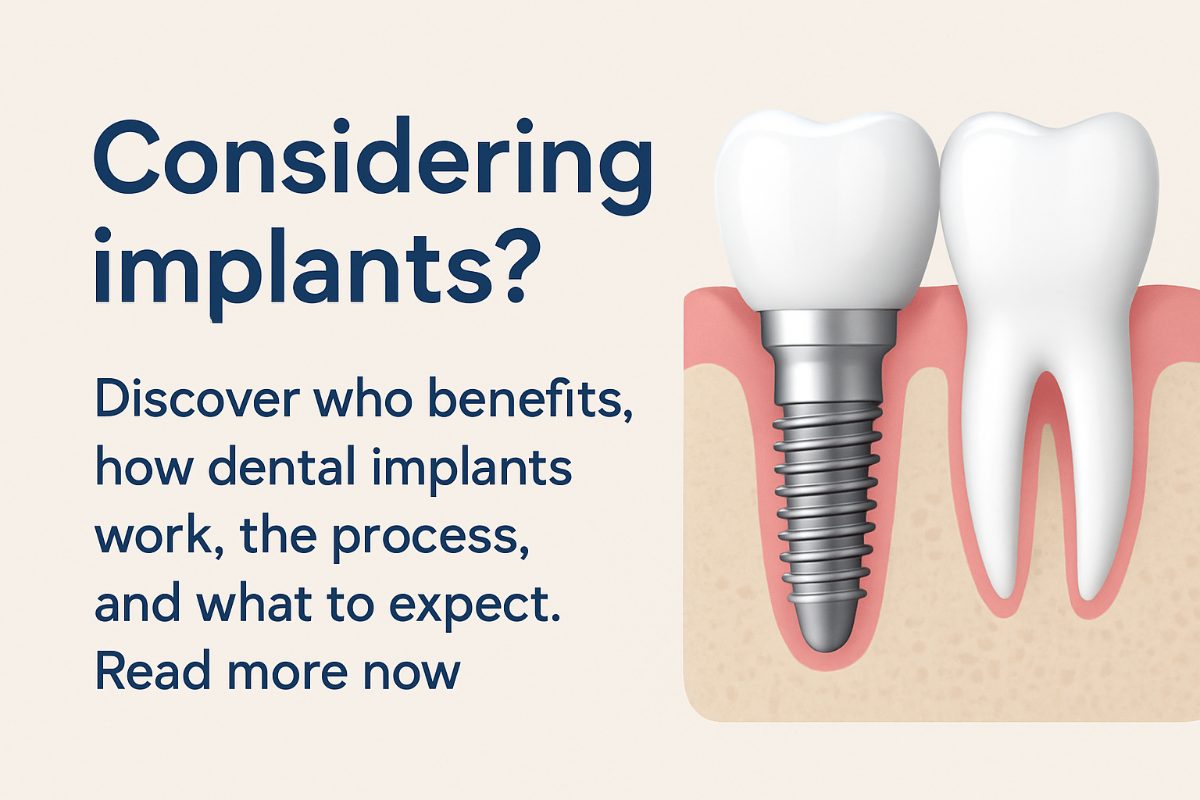implants matter because they restore chewing, speech, and confidence for people with missing teeth. This guide explains who benefits, how implants work, the steps involved, and practical next steps for implants in Leeds, AL and beyond.
What are implants (dental implants)?
implants are artificial tooth roots placed into the jaw to hold replacement teeth. A typical implant system has three parts: the implant (a small titanium screw placed in bone), the abutment (a connector), and the crown (the visible tooth). Together they replace both the root and the tooth for a stable, natural-feeling result.
Common types of implants
Single-tooth implants
Single-tooth implants replace one missing tooth. The dentist places one implant in the jaw and attaches an abutment and a crown. This keeps nearby teeth untouched and restores normal bite and chewing.
Multiple implants and implant-supported bridges
When several adjacent teeth are missing, two or more multiple implants can support an implant bridge. This avoids removable dentures and gives stronger, longer-lasting support than traditional bridges.
Full-arch solutions (All-on-4 style implants)
Full-arch restorations use a set of implants to support a whole upper or lower row of teeth. All-on-4 style implants usually use four to six implants to hold a fixed prosthesis. They help people who wear dentures or have few remaining teeth get a stable, fixed smile.
Who is a good candidate for implants?
Good candidates are generally healthy adults who want a long-term tooth replacement. Key factors:
- Overall health: controlled chronic conditions (like diabetes) are usually OK; uncontrolled illness may need medical clearance.
- Bone volume: enough jawbone is needed for implant support, or bone grafting may be recommended.
- Oral hygiene: strong daily care and regular dental visits help implant success.
- Smoking: quitting improves healing and long-term results.
- Realistic expectations: implants are durable but require time, care, and occasional maintenance.
Step-by-step: what to expect during the implant process
Consultation & planning
Expect a full exam, medical history review, and digital imaging. 3D scans and treatment planning map precise implant positions. This planning improves accuracy and outcomes for implants in Leeds, AL.
Surgery & placement
During surgery, the implant is placed into the jaw. Many patients get local anesthesia and optional sedation. Surgery time varies by case, and most people return home the same day. In some protocols, temporary teeth are placed right away.
Healing & restoration
Osseointegration is the healing process where bone bonds to the implant. This takes weeks to months. After healing, the abutment and final crown or bridge are attached. Some practices offer same-day crowns or provisional restorations for quicker function.
Benefits and risks of choosing implants
Key benefits
- Longevity: implants can last decades with good care.
- Function: stronger bite and better chewing than dentures.
- Bone preservation: implants help prevent jawbone shrinkage.
- Appearance: crowns look and feel like natural teeth.
Possible risks and side effects
Risks are low but include infection, nerve irritation, sinus issues (upper jaw), and implant failure. Risk is minimized with careful planning, precise surgery, and good hygiene. Your dentist will explain how risks apply to your situation.
Aftercare, maintenance, and lifespan of implants
Daily brushing and flossing, routine dental cleanings, and checkups keep implants healthy. Avoid hard or sticky habits that stress restorations. With consistent care, many implants last 15–30+ years; crowns may need replacement sooner.
Cost, insurance, and financing for implants
Costs vary by the number of implants, need for grafting, and type of final restoration. Insurance may cover part of crown or surgical fees but often not the full implant cost. Many practices offer financing plans or payment options to make implants affordable.
Why advanced technology matters for implants
Digital imaging, guided implant systems, and in-house labs improve accuracy, speed, and comfort. CEREC same-day crown technology and chairside milling can reduce visits. Sedation options make longer procedures easier for anxious patients. These tools increase predictability and faster results for implants in Leeds, AL.
About Koplon Implant & Family Dentistry
Koplon Implant & Family Dentistry is a family-run practice with decades of implant experience. The father-and-son team brings surgical and restorative skill, All-on-4 capability, and an in-house digital lab for efficient, same-day restorations. Their focus on technology and patient comfort supports reliable outcomes for people choosing implants.
Next steps: interested in implants?
If you’re considering implants, schedule a consultation to review your medical history, imaging, and personalized options. A short visit can clarify candidacy, timelines, costs, and the best path forward for implants in Leeds, AL. Ready to learn more? Contact Koplon Implant & Family Dentistry to start the conversation.





